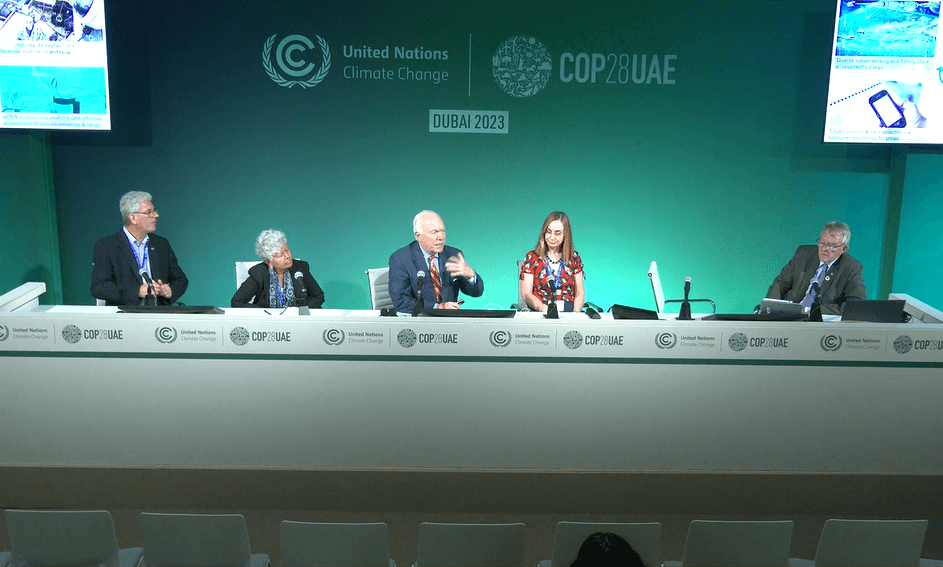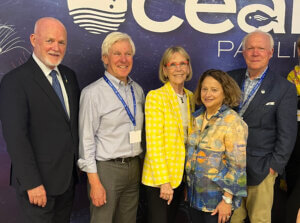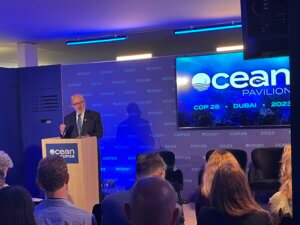Monmouth University Urban Coast Institute (UCI) Director Tony MacDonald traveled to Dubai, United Arab Emirates, for the United Nations COP28 climate summit, where the UCI was designated as an official observer. Below he shares details and impressions from the proceedings.
Dec. 12: Elevating the Ocean on the Agenda
The ocean community has been well represented at COP28, as we descended on Dubai to draw attention to the importance of ocean issues to the U.N. Framework Convention for Climate Change (UNFCC) negotiations. Discussions have covered action to reduce greenhouse gas emissions through commitments to green shipping or expansion of renewable energy sources and development of offshore wind, as well as efforts that will reduce climate impacts on the ocean ecosystem, ranging from increased ocean acidification to sea level rise.
For the second time, there was a dedicated Ocean Pavilion in the so-called “Blue Zone,” where national delegates and approved observer organizations like the Urban Coast Institute meet during the two weeks of COP negotiations. It was a beehive of activity hosting numerous panels and attracting ocean leaders including U.S Special Climate Envoy John Kerry, U.N. Special Envoy for Oceans Peter Thomson, and U.S. Sens. Sheldon Whitehouse (Rhode Island), Ed Markey (Massachusetts) and Ben Cardin (Maryland).

Prior to the conference, the UCI signed on to the COP28 Dubai Ocean Declaration joining partners of the Ocean Pavilion and others to call on world leaders to expand ocean observations worldwide to provide a basis for understanding ongoing natural and anthropic change and for planning climate mitigation and adaptation strategies. I was joined at COP28 by four colleagues from the Global Ocean Forum (GOF) who, along with the UK-based Plymouth Marine Laboratory, organized a Virtual Ocean Pavilion (VOP) so that those who could not travel to Dubai could track activities and participate in high-level panels addressing critical ocean-climate issues.
The UCI also joined with the GOF to organize an official side event in the Blue Zone titled “Investing in Ocean Nature-based Solutions to Mitigate and Adapt to Climate.” National Oceanic and Atmospheric Administration (NOAA) Administrator Rick Spinrad provided the opening remarks for the event. I delivered a presentation on the panel entitled “Climate Adaptation for Area-Based Conservation: Data Collection and Management,” which covered examples of work we are doing in the Mid-Atlantic. A recording can be viewed here.
While these ocean discussions have been very productive, and I am confident we will be able to report on success in elevating the ocean-climate nexus at COP28, the elephant in the room is that we cannot achieve our goals for the ocean without an unequivocal commitment to the reduction of greenhouse gases, ambitious development for renewable energy alternatives and a rapid phaseout of fossil fuel emissions. Even though the COP negotiations were scheduled to conclude today, the parties have not reached consensus on how they will address this fundamental question and whether the final agreement will provide for the phase down or phase out of fossil fuels. Stay tuned.
Dec. 18: Did the Negotiations Make a Difference?
The negotiations at COP28 in Dubai concluded on Dec. 13. The negotiations brought together almost 200 countries and more than 80,000 registered participants. The meeting went into overtime as parties debated how to address, or whether even to acknowledge, the need to phase out fossil fuels. Like beauty, whether the negotiations were a success is very much in the eye of the beholder.
The final text calls for “transitioning away from fossil fuels in energy systems, in a just, orderly and equitable manner,” falling short of calls for a commitment for a full phase-out. In addition, more than 120 nations – including the U.S. and China – agreed to triple renewable energy installations by 2030. Despite these commitments, the latest report of the Intergovernmental Panel on Climate Change (IPCC) concluded that there is a substantial implementation gap between the Parties’ climate strategies and the level of action required to achieve the goals of the Paris Agreement struck at COP21 in 2015. Parties will need to show much greater ambition in the next iterations of their national climate plans, referred to as NDCs (National Determined Contributions). It is also important to remember that these, along with promises of critical increased financial contributions, are non-binding commitments that will require ocean community advocates and civil society to redouble their efforts to ensure implementation of ocean- climate action and hold the parties accountable.

There is no doubt, however, that the ocean community was mobilized like never before to carry the message that addressing the ocean-climate nexus is essential to addressing climate change. The UCI worked with colleagues from the Global Ocean Forum and Plymouth Marine Laboratory to host the COP28 Virtual Ocean Pavilion (VOP), providing online panels as well as to links to hundreds of ocean-related side events. At the COP venue, partners of the Ocean Pavilion, led by Woods Hole Oceanographic Institute and Scripps Institution of Oceanography, provided a buzzing hub of activity and hosted events bringing together ocean-climate leaders, scientists and policy advocates from around the world.
There was also considerable progress in elevating the role of nature and oceans as a solution to the climate crisis. The preamble noted “the importance of ensuring the integrity of all ecosystems, including … the ocean.” Other sections called out the “the importance of conserving, protecting and restoring nature and ecosystems” and invited parties “to preserve and restore oceans and coastal ecosystems.” The final agreement urges increased ambition and enhanced action to reducing climate impacts on ecosystems, including restoration and conservation and the protection of marine and coastal ecosystems.
There was also a call to build greater synergies between the Paris Agreement, U.N. Framework Convention on Climate Change, and other U.N. biodiversity and ocean action agreed to earlier this year, especially the Kunming-Montreal Global Biodiversity Framework and the Biodiversity Beyond National Jurisdiction (BBNJ) agreement on the conservation and sustainable use of marine areas in the high seas. I had the privilege of moderating the High-Level Closing Panel of the VOP, “Climate Change and the BBNJ.” Panelists included Singapore Ambassador for International Law Rena Lee, who served as president of the BBNJ negotiations and artfully guided the conference over the finish line; UNESCO Intergovernmental Oceanographic Commission Executive Secretary Vladimir Ryabin; and International Union for Conservation of Nature Senior High Seas Advisor Kristina Gjerde. All speakers emphasized not only the importance of oceans and biodiversity, but a call to action to work with countries to secure the prompt ratification by the minimum 60 nations. (To view a recording, login to the VOP and visit the Pavilion Agenda page.)

In addition to the formal COP negotiations there were daily announcements of side agreements by governments, industry, finance and philanthropic organizations to support ocean-climate action. Special Presidential Envoy on Climate John Kerry, U.N. Secretary General’s Special Envoy for the Ocean Peter Thomson, and philanthropic partners announced the formation of Ocean Resilience and Climate Alliance (ORCA), with an initial pledge of more than $250 million for advancing ocean-based solutions to fight climate change. The U.S. also announced several domestic initiatives including the first-ever Ocean Justice Strategy to provide long-term, sustainable benefits for people, communities, and the environment. At the Ocean Pavilion, National Oceanic and Atmospheric Administration (NOAA) Administrator Rick Spinrad, along with the State Department, released a national Ocean Climate Action Plan to comprehensively address the impacts of ocean acidification. The State Department announced it would continue to facilitate Green Shipping Corridors in the U.S. and worldwide, and the Department of the Interior announced a roadmap tool to utilize nature-based solutions in its efforts to tackle the climate crisis.
While Dubai is literally halfway around the world and the COP28 negotiations can seem esoteric and far removed from everyday life at the Jersey Shore, we can literally see the challenges play out in real-time as the increasing frequency and intensity of coastal storms threaten coastal communities, proposals for offshore wind development raise controversy, and oceans are increasing warming and getting more acidic, impacting fisheries and ecosystem health. At the UCI, we are doing our part to take ocean-climate action now, including supporting regional ocean planning and the Mid-Atlantic Ocean Data Portal, climate-ready fisheries, and coastal community resilience and adaptation. Monmouth University scientists are conducting cutting-edge research on marine environmental DNA and acoustics, and engaging Monmouth students to conduct research and be part of the solution. I encourage you to browse the UCI’s blog for updates on these important efforts.

